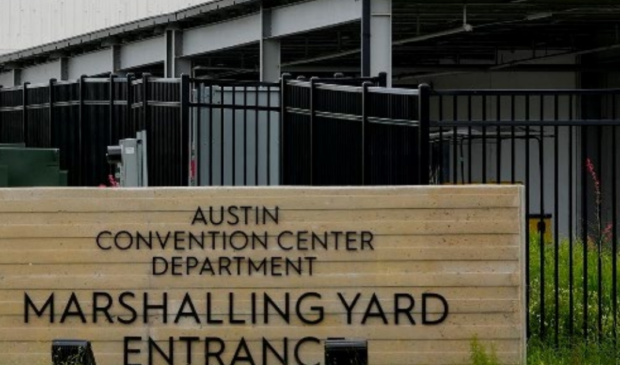Fuentes airs budget concerns over move to keep Marshalling Yard shelter open indefinitely
Thursday, September 19, 2024 by
Chad Swiatecki City Council Member Vanessa Fuentes has signaled her concerns with a resolution scheduled for next week’s meeting that could result in keeping a 300-bed emergency shelter open far longer than it was originally budgeted for.
The resolution directs the city manager to find the estimated $9 million it would cost to keep the Marshalling Yard Emergency Shelter open for another year, with the possibility of further extensions until a site can be found for a comparable emergency shelter facility. Located in District 3 near one of the borders of Fuentes’ District 2, the Marshalling Yard was originally intended as a short-term solution to provide emergency shelter and other resources while the city and partner groups continue to add permanent supportive housing units.
Council approved a budget amendment to extend the facility’s closing date until March 2025, with the city’s Homeless Strategy Office already taking steps to decrease intake there as well as at other emergency shelters that would eventually have to absorb hundreds of clients who have been living at the Marshalling Yard.
Fuentes said the city’s recently approved budget already required a drawdown from reserves to cover some of the identified needs related to homelessness, with no consideration given toward covering the $9 million cost for the Marshalling Yard. She first shared her views on the resolution via a posting on the City Council Message Board.
“Nowhere as part of those conversations did it come up about this need to continue to operate the Marshalling Yard, and the funding gap that is apparent to do so. The previously provided direction from Council to the city manager was to wind down operations at the Marshalling Yard,” she told the Austin Monitor. “Having emergency shelters is important, and we have to have that as part of our overall homelessness response system, but we also know that we have limited public dollars available. If we’re potentially being asked to reauthor to prioritize a $9 million operation or to find $9 million, it needs to be well thought out, and we need to have a robust policy conversation.”
Fuentes said she is in favor of the resolution’s call to find an alternative site for a large-scale emergency shelter and to look for ways to improve the rate of successful exits into stable housing for those who enter the facility, which was constructed as a storage and supply facility for the Austin Convention Center. Her primary concern is the possibility that other city services such as parks or libraries could have their budgets reduced in the process of identifying the needed $9 million.
David Gray, the city’s homeless strategy officer, said the Marshalling Yard will continue toward its planned spring closure unless the needed money is found and the city can agree to an extension of its contract with Family Endeavors, the vendor that manages the facility. While the city has added capacity to four other emergency shelters over the past year, Gray said it would be a challenge to lose 300 beds from a homeless system that is dealing with a high rate of chronic homelessness, according to a recent report from Ending Community Homelessness Coalition (ECHO).
With a substantial decrease in emergency shelter capacity, Gray said the city would not be able to move inhabitants of dispersed homeless encampments into a stable shelter.
“We know once the Marshalling Yard goes away, we’re no longer going to have capacity in our system to bring any new people in (from encampments),” he said. “It doesn’t mean that we stop encampment cleanups. If an encampment is in a place where people’s lives are at risk, we will move to close the encampment. But that being said, the central tenet (of the Housing-focused Encampment Assistance Link program) is bringing people from the encampment into shelter. Unfortunately, we’re not going to be able to do that as we plan for the Marshalling Yard ramp-down.”
Matt Mollica, executive director of ECHO, said the city needs to find ways to fund all services previously funded by federal American Rescue Plan money, to address the many phases of the service and assistance systems people go through after losing their home. With emergency shelter as often the most costly step in the process, he said services such as rental assistance and those connected to permanent supportive housing could lose out to pay for extending the Marshalling Yard.
“We’re trying to pick and choose what we invest in instead of looking at the whole system and just making a commitment as a community that we’re going to figure out how to fund enough housing for people that need it in Austin,” he said. “There has to be avenues out of emergency shelter in the Marshalling Yard into permanent housing. There needs to be intentional resources put behind that so folks know that when they get into that shelter, they’re there for a period of time, hopefully just a couple of months, and then they’re moving out of that shelter into permanent housing.”
The Austin Monitor’s work is made possible by donations from the community. Though our reporting covers donors from time to time, we are careful to keep business and editorial efforts separate while maintaining transparency. A complete list of donors is available here, and our code of ethics is explained here. This story has been changed since publication to clarify Matt Mollica’s statement.
You're a community leader
And we’re honored you look to us for serious, in-depth news. You know a strong community needs local and dedicated watchdog reporting. We’re here for you and that won’t change. Now will you take the powerful next step and support our nonprofit news organization?







